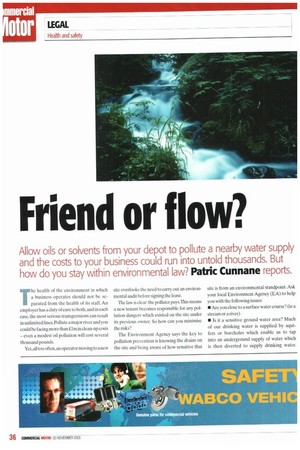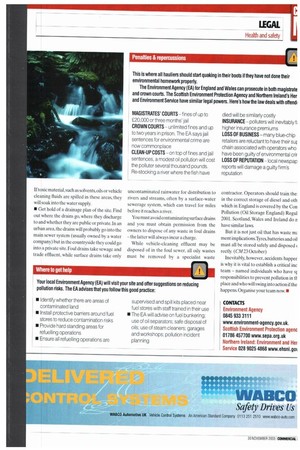Friend or flow?
Page 36

Page 37

If you've noticed an error in this article please click here to report it so we can fix it.
Allow oils or solvents from your depot to pollute a nearby water supply and the costs to your business could run into untold thousands. But how do you stay within environmental law? Patric Cunnane reports.
The health of the environment in which a business operates should not be separated from the health of its staff. An employer has a duty of care to both,and in each casc, the most serious transgressions can result in unlimited fines. Pollute a major river and you could be facing more than £ 1 m in clean-up costs — even a modest oil pollution will cost several thousand pounds.
Yet,all too often.an operator moving to anew site overlooks the need to carry out an environmental audit before signing the lease.
The law is clear: the polluter pays.This means a new tenant becomes responsible for any pollution dangers which existed on the site under its previous owner. So how can you minimise the risks?
The Environment Agency says the key to pollution prevention is knowing the drains on the site and being aware of how sensitive that site is from an environmental standpoint. Ask your local Environment Agency (EA) to help you with the following issues: • Arc you close to a surface water course? (ie a stream or a river) • Is it a sensitive ground water area? Much of our drinking water is supplied by aquifers or boreholes which enable us to tap into an underground supply of water which is then diverted to supply drinking water. If toxic material.such as solvents, oils or vehicle cleaning fluids are spilled in these areas, they will soak into the water supply.
• Get hold of a drainage plan of the site. Find out where the drains go, where they discharge to and whether they are public or private. In an urban area, the drains will probably go into the main sewer system (usually owned by a water company) but in the countryside they could go into a private site. Foul drains take sewage and trade effluent, while surface drains take only uncontaminated rainwater for distribution to rivers and streams, often by a surface-water sewerage system, which can travel for miles before it reaches a river.
You must avoid contaminatingsurface drains and you must obtain permission from the owners to dispose of any waste in foul drains the latter will always incur a charge.
While vehicle-cleaning effluent may be disposed of in the foul sewer, all oily wastes must he removed by a specialist waste contractor. Operators should train the in the correct storage of diesel and oth which in England is covered by the Con Pollution (Oil Storage England) Regul 2001. Scotland. Wales and Ireland do ii have similar laws.
But it is not just oil that has waste mi ment implications.Tyres,batteries and oil must all be stored safely and disposed rectly. ( CM 23 October) Inevitably, however, accidents happer is why it is vital to establish a critical inc team named individuals who have sr responsibilities to prevent pollution in th place and who will swing into action if the happens. Organise your team now. •
































































































































































































